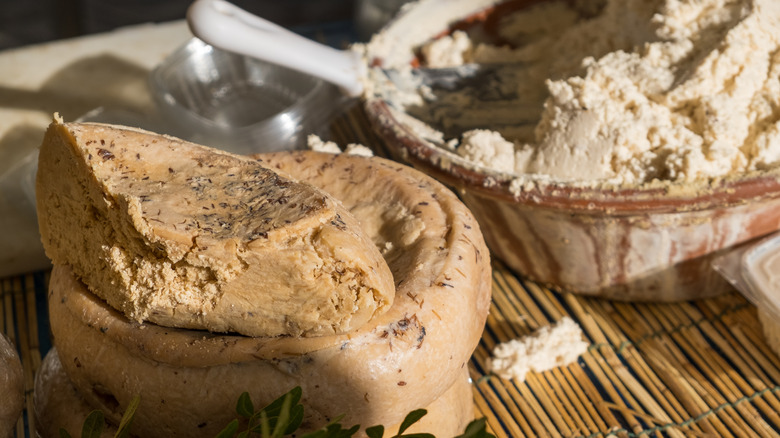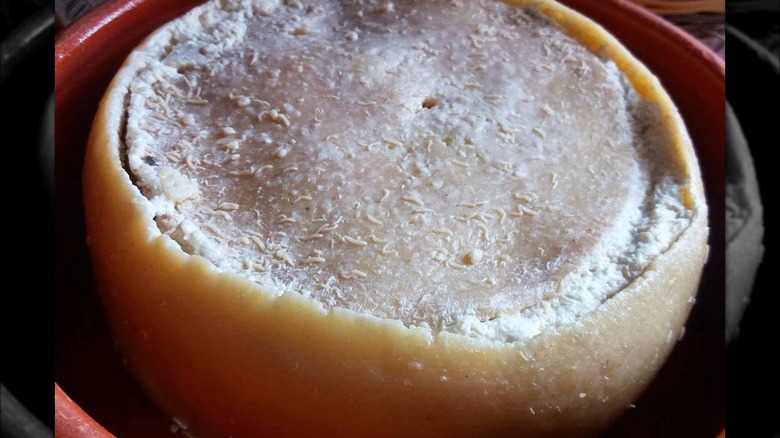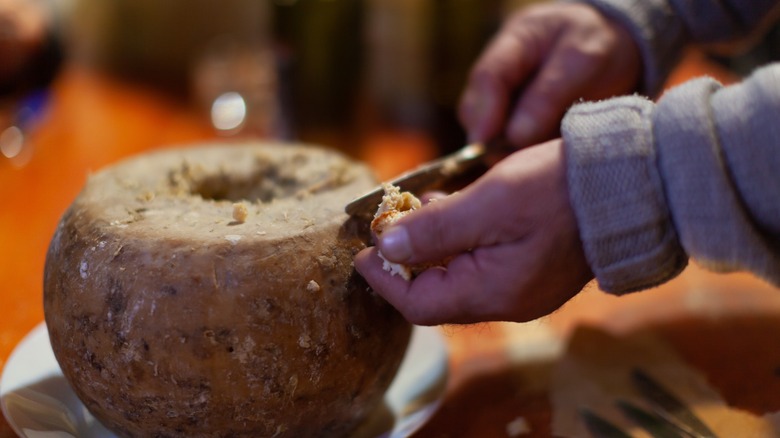Would You Try A Cheese That Contains Maggots?
Since its debut season in 2001, "The Amazing Race" has put teams in some pretty precarious situations. Many of the most spine-tingling challenges involve extreme heights. Things like rappelling down vertigo-inducing skyscrapers, traversing wobbling foot bridges suspended over deep ravines, or free-falling into a rocky gorge. Others — like the hit television show's food challenges — seem more mundane in comparison. But, if there's one food challenge that takes the cake it would have to be the time competing teams came face to face with casu marzu, a maggot-infested cheese. It's one of the many unusual delicacies of the Italian island of Sardinia — one that's also been called the world's most dangerous cheese.
So, with no winnings on the line, would you try some, just for the story and thrill of adventure? Before you make up your mind, let's dig a little deeper into what exactly you're up against. We've all heard the saying, "You eat with your eyes first." When it comes to casu marzu that means getting past the initial appearance — a wriggling, writhing hunk of cheese infested with squirming live maggots. For most of us, that sight may be the most off-putting part of the experience. In a surprise twist, the smell isn't that bad. It's often described as sharp, but not in an unpleasant or spoiled way. The taste? Those in the know describe it as being similar to ripe gorgonzola.
Just how dangerous is casu marzu?
Just when you think you've worked up the courage to pop a piece of casu marzu in your mouth, you remember that part about it being called the world's most dangerous cheese. Is it, though?
That's a matter of opinion. It all goes back to 2009 when Guinness World Records bestowed the questionable accolade on the pecorino variety, asserting that it poses a health risk. This is because live maggots can theoretically survive the human digestive process, pass through intestinal walls and cause in its host: vomiting, abdominal pain, and bloody diarrhea.
On the other hand, in 2021 CNN cast doubt on the concerns surrounding the consumption of casu marzu, deferring to Robert Flore, a food researcher affiliated with Skylab FoodLab. Flore, an expert in the study of insects as a food source, attributed the squeamishness surrounding the cheese to cultural differences, suggesting diehard lovers of casu marzu would, in mutual fashion, look askance at food choices in Asian culinary traditions, like eating crickets or other similar insects.
"I believe that nobody has ever died eating casu marzu," Flore told CNN. "If they did, maybe they were drunk. You know, when you eat it, you also drink lots of wine." It's also very unlikely you're not chewing the cheese and any accompanying critters as it goes down. If you can take him at his word, go ahead and dig in. But, first you'll have to find it. And that's surprisingly difficult.
A quest for culinary adventure
Did we mention casu marzu is illegal? Although it enjoys unofficial protected status on the island of Sardinia — local officials turn a blind eye its presence — the Italian government outlawed it 1962. It's not just Italy; casu marzu is banned in almost every country around the world. It's even on the list of foods banned in the United States. While it enjoys quasi-protected status in Sardinia, it's not readily available on the island. Getting your hands on a sample can seem like a clandestine operation. Adventurous souls report transactions of the wink-and-a-nod or I-know-a-guy-who-knows-a-guy variety. It's a quest that often leads to pastoral regions high in the mountains — places where long-ago shepherds made do with sparse, and sometimes spoiled, provisions. Which brings us to the genesis of casu marzu.
It's difficult to trace its exact provenance, the consensus is the Sardinian specialty is an accident of nature. Faced with going hungry or eating the maggot-infested cheese, shepherds chose the cheese — and actually liked it. Now it's your turn. Words to the wise. The larvae will squiggle, even jump, when the cheese is disturbed. If there's no jumping, don't indulge. In an ironic twist, dead maggots indicate the cheese is spoiled. You can, however, render them temporarily unconscious. The trick involves sealing the cheese in a paper bag. The larvae will ping around as they suffocate. When the action stops, it's time to eat. If you do find casu marzu, be prepared to indulge. Sardinians consider it rude to turn down an offer of food.


